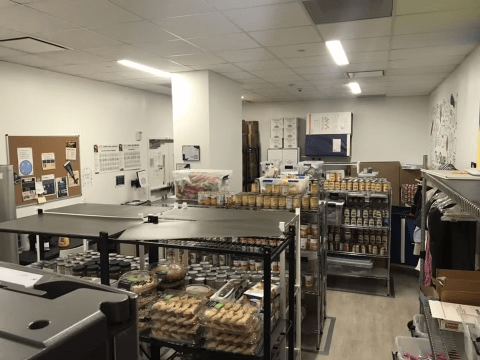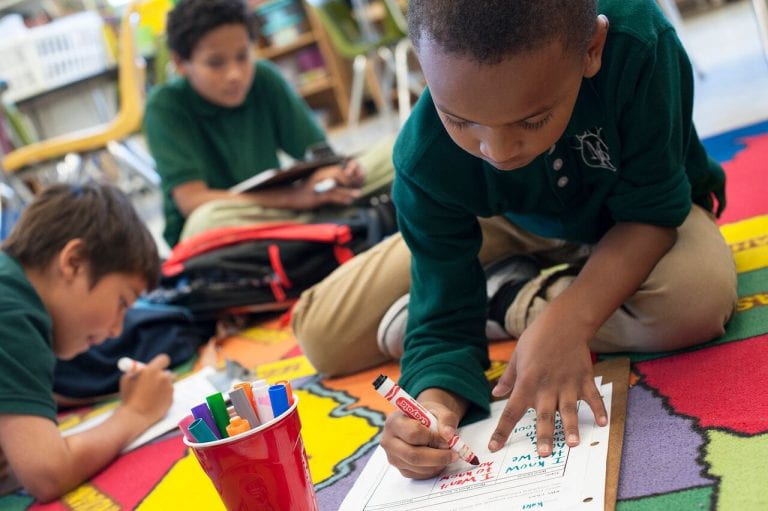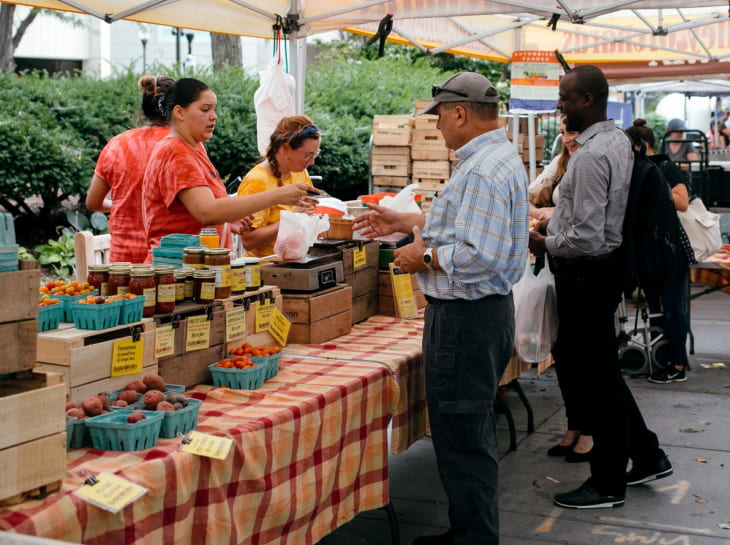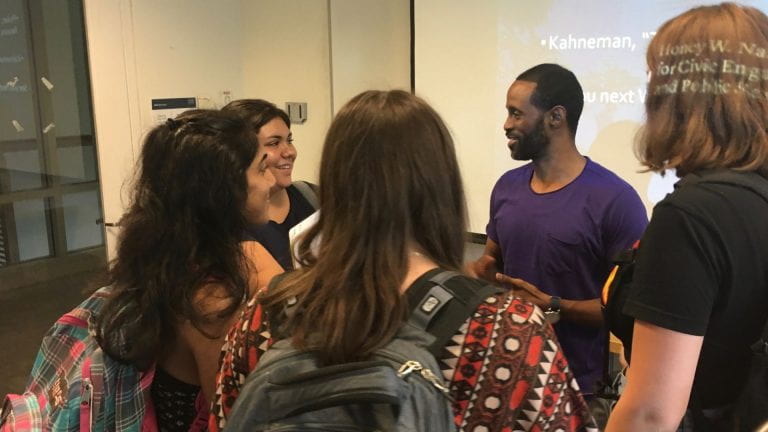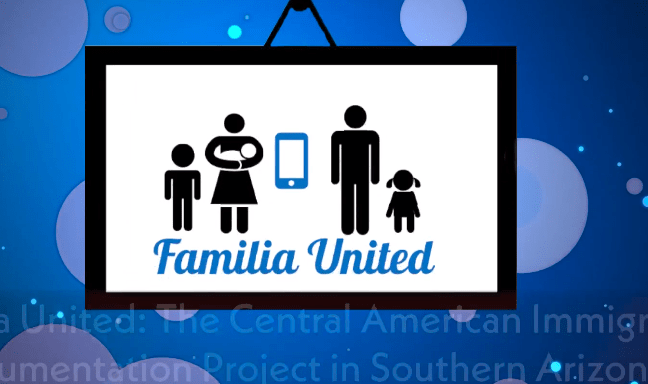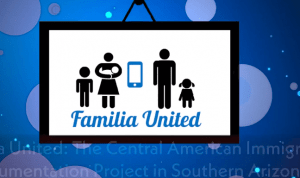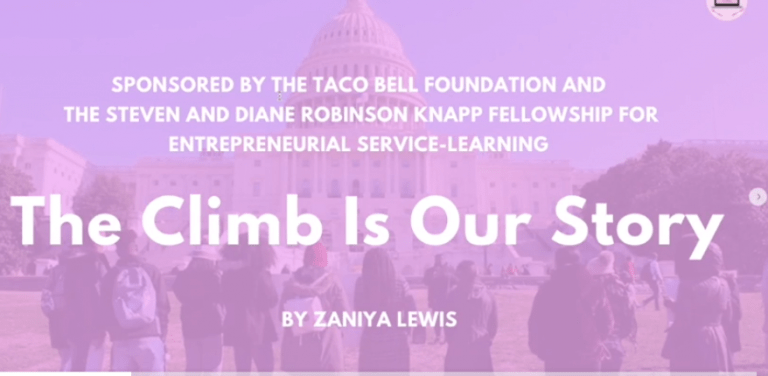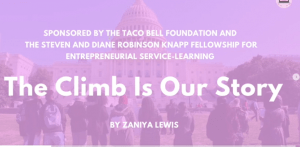Category: Nashman Center Programs
Notes from Nashman Center sponsored workshops, panel presentations, and more.
HSSJ 3100W Program Planning & Evaluation
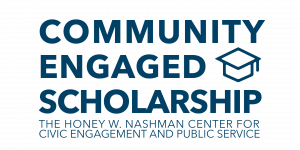
In HSSJ 3100W: Program Planning and Evaluation, students partner with organizations like YWCA, Rock Creek Conservancy, and Horton's Kids to conduct real-world program evaluations. While providing data and analysis to help organizations improve programs, students gain practical skills in data collection (surveys, interviews, etc.), data analysis, meaning-making and reporting.
Community-serving organizations who partner with this course identify the program they would like students to evaluate, for example, do volunteers of this organization feel prepared by the orientation and training they receive, or is their parent involvement program achieving its goals? Students and community organization staff work together to clarify the research question and identify sources of data. With final approval from community partners, students develop data collection tools (surveys, interview or focus group protocols, etc.) and ultimately produce a written report which includes a relevant review of research literature, study findings, and recommendations.
This course challenges students, and they love realizing what they are capable of. Dr. Walls and Dr. Kelso prepare students for each step: creating the agenda for their first community partner site visit, practicing interviewing and focus group skills in class, and doing in-class peer review of multiple drafts of the final reports and presentations shared with their community partners. Students also learn project management techniques.
For information about Community Engaged Scholarship at GW: https://go.gwu.edu/cesc
...continue reading "HSSJ 3100W Program Planning & Evaluation"
GW News and Events: Announcing our Knapp Fellows for 2022-2023
The Honey W. Nashman Center for Civic Engagement and Community Service is honored to announce the three selected Knapp Fellows for academic year 2022-2023: Jennifer Ko, Bailey Moore, and Grace Rafferty.
The Steven and Diane Robinson Knapp Fellowship for Entrepreneurial Service-Learning aims to recognize, reward, and facilitate creative public service and academic engagement led by GWU students, undergraduate and graduate. Selected students design and implement entrepreneurial service-learning projects that make a significant difference in the lives of others.
Jennifer Ko

Jennifer Ko (she/her) is a graduate student in the Masters in Public Health (MPH) Epidemiology program, at GW's Milken Institute School of Public Health. The faculty advisor for her project is Dr. Sean Cleary, Professor of Epidemiology from the Milken School.
Knapp Fellow Ko’s project aims to allow adults with developmental disabilities (DD) to participate in a 10-week course on health and wellness, and to learn the basic principles of healthy activities that can be easily recalled and applied in their everyday lives. Ko’s Health Really Matters curriculum is an expansion of the first Health Matters course offered in Spring 2022. With this project, Ko targets the prevalent issue of poor mental and physical health commonly seen in adults with disabilities that are often the direct result of poor diet and sleep habits, lack of physical activity, mood disorders, core problems with relationships, and lack of community integration. This project aims to provide adults with DD with the skills they need to become better stewards of their health through distinct realistic goals and easily replicable tasks that reinforce ways to incorporate healthy measures into everyday life. Ko plans to track progress of her autistic particpants through pre- and post-activity survey data collection.
Ko partners with non-profit Our Stomping Ground (OSG) for this project, whose mission aims “to build inclusive communities and strengthen neighborhoods through diverse programming, sustainable, affordable housing, and social spaces for people of all abilities.”
Bailey Moore

Bailey Moore (she/her) is a junior at GW, majoring in Public Health, with a minor in Human Services and Social Justice, and a micro-minor in Health Equity. She aspires to be a medical physician, specializing in obstetrics and gynecology, to combat the inequalities Black people face within the child-birthing systems in the US. Moore’s faculty advisor for the project is Dr. Maranda Wardfrom the GW School of Medicine and Health Sciences.
Through her Knapp Fellowship, Moore plans to expand the Sisters Informing, Healing, Living, and Empowering (SIHLE) DC-based program, an already-existing peer-led training and educational intervention for Black girls and women between the ages of 14 and 19, who are at risk for negative sexual health outcomes. Moore is working in conjunction with SIHLE’s current programming to develop a supplementary curriculum on new topics, such as sexual hygiene and consent & communication; And she is also developing a training for young Black women between the ages of 19 and 23, who are SIHLE alumni or would like to become a peer educator, to educate them on sexual health advocacy and reproductive justice.
For her project, Moore is working with Planned Parenthood of the Metropolitan Washington D.C. (PPMW) as her community partner to create and facilitate this program series, while also amplifying young women’s voices by including them in the curriculum development.
Grace Rafferty

Grace Rafferty (she/her), a double-major junior at GW, is pursuing her B.A. in Human Service & Social Justice and another B.A. in Music. Rafferty’s faculty advisor for her project is Dr. Michelle Kelso from the Department of Sociology at the Columbian College of Arts & Sciences.
As a Knapp Fellow, Rafferty is developing an after-school mentorship program for DC high school students to become informed and engaged civic leaders in their communities through service and advocacy. Rafferty aims to do this by building connections between George Washington University students and DC public high school students to provide mentorship, advising, and guidance on intentional community service. Since District of Columbia Public Schools (DCPS) students are required to complete 100 hours of service to graduate, Rafferty strives to expand upon this by building capacity and raising awareness on the value of serving one’s community, as well as informing the mentees on future academic and professional opportunities. The program aims to create civic leaders of these high schoolers, rather than students simply completing service hours without goals or meaningful reflection.
Grace is partnering with the Honey W. Nashman Center for Civic Engagement and Public Service and with the DCPS Counseling Team to develop the program, connect with DC high schools, and recruit GWU student mentors for this project.
HSSJ 2171: Child & Adolescent Development

This course by Prof. Sangeeta Prasad pertains to theories of human development from infancy to young adulthood. Dominant psychosocial, cognitive, and physical competencies; motivational changes; coping styles; and normative and non-normative behaviors. In addition to lectures, students served at least three hours per week in an appropriate agency, but many did more.
Prasad, a psychologist who teaches in the Human Services and Social Justice department, is also one of the founders of In the Streets, a D.C.-based nonprofit with a community-first approach to dealing with trauma. Rather than bringing outsiders in to help people in Black, underserved communities, the nonprofit creates a space for community members to work through trauma affecting their physical and mental health altogether.
Students serving with In the Streets built close relationships with participants through weekly calls and group meetings. In doing so, students were able to share resources, support, and learn directly from participants about social services. This semester, In the Streets, was also featured in the Washington Post, a testament to the organization’s growing presence.
For information about Community Engaged Scholarship at GW: https://go.gwu.edu/cesc
...continue reading "HSSJ 2171: Child & Adolescent Development"
BISC 1007: Food, Nutrition, and Service

Students in Dr. Scully’s Food, Nutrition, and Service class were able to learn about the study of biology and nutrition directly through hands-on service projects in their community. Through community-based lab activities and projects, students had the opportunity to receive an in-depth look at the concepts being taught in this service-learning course, reinforcing the importance of sustainable food systems. Student teams collaborated with a wide range of community partners to design and implement educational workshops, activities or resource materials aimed at educating the public on food and nutritional concepts.
For information about Community Engaged Scholarship at GW: https://go.gwu.edu/cesc
...continue reading "BISC 1007: Food, Nutrition, and Service"
UW 1020: Writing Lives, Composing Consciousness and Service Learning
 All entering students take UW 1020, a four-credit course to enable students to write effectively in various contexts, within the university and beyond. In Professor Pamela Presser's sections of this course, students seek to deepen their understanding of identity and composition of consciousness through service with organizations within the DC community. Students explore how service shapes their own identities. Students serve with many organizations including: Brotherhood Synagogue; City Gate, Inc.; Bread for the City; Francis on the Hill; Little Friends for Peace; Peace 4 Kids; Reading Partners; and the Smithsonian Transcription Center, etc.
All entering students take UW 1020, a four-credit course to enable students to write effectively in various contexts, within the university and beyond. In Professor Pamela Presser's sections of this course, students seek to deepen their understanding of identity and composition of consciousness through service with organizations within the DC community. Students explore how service shapes their own identities. Students serve with many organizations including: Brotherhood Synagogue; City Gate, Inc.; Bread for the City; Francis on the Hill; Little Friends for Peace; Peace 4 Kids; Reading Partners; and the Smithsonian Transcription Center, etc.
For information about Community Engaged Scholarship at GW: https://go.gwu.edu/cesc
...continue reading "UW 1020: Writing Lives, Composing Consciousness and Service Learning"
Deepening Partnerships: LAYC and GW
Deepening Partnerships: The Latin American Youth Center (LAYC) and George Washington University
February 25, 2022, noon-1:30pm
Hosted by the Honey W. Nashman Center for Civic Engagement and Public Service
Partner: Latin American Youth Center
This Deepening Partnerships event brought together LAYC staff, and the GW students, faculty, and staff who have worked with the LAYC this year on a variety of service projects.
Deepening Partnerships Pre-Event Information: LAYC and GW
This Nashman Center's Deepening Partnerships event with the Latin American Youth Center will connect students, faculty, and LAYC staff in dialogue about our shared aims. Our collective goal is to practice active and empathic listening, deepen relationships, and honor our collective knowledge, experience and perspectives as we co-create our partnerships and initiatives.
February 25, 2022, noon-1:30pm
Hosted by the Honey W. Nashman Center for Civic Engagement and Public Service
Partner: Latin American Youth Center
...continue reading "Deepening Partnerships Pre-Event Information: LAYC and GW"
Youth Air Quality Initiative: A Knapp Fellowship
Catherine O'Donnell, Elizabeth Mason, and Perrin Krisko make air quality monitoring accessible
...continue reading "Youth Air Quality Initiative: A Knapp Fellowship"
GTCH 1002 Inquiry Based Lesson Design
 The GWTeach program by Prof. SuJin Choi prepares STEM majors for teaching licensure in Washington, DC. This course builds on the basics of teaching learned in GTCH 1001, with a focus on inquiry-based lesson design, teaching with technology, classroom management, and analyzing student performance data. Students partnered with teachers in local middle schools, designing and teaching a STEM lesson in a middle school classroom.
The GWTeach program by Prof. SuJin Choi prepares STEM majors for teaching licensure in Washington, DC. This course builds on the basics of teaching learned in GTCH 1001, with a focus on inquiry-based lesson design, teaching with technology, classroom management, and analyzing student performance data. Students partnered with teachers in local middle schools, designing and teaching a STEM lesson in a middle school classroom.
For information about Community Engaged Scholarship at GW:https://go.gwu.edu/cesc
TRDA 3131W
 Professor Kanter's Community Engaged Scholarship course (CES), Theater for Social Change (TRDA 3131W), focuses on the efficacy of using the arts to address issues within our society. Through their theater knowledge and service to local organizations, students examine produced works of representative 20th and 21st century playwrights, which address violence against women, gender inequality, homophobia, racism, trauma of war, Nativism, religious discrimination, and other injustices that continue to impact our society.
Professor Kanter's Community Engaged Scholarship course (CES), Theater for Social Change (TRDA 3131W), focuses on the efficacy of using the arts to address issues within our society. Through their theater knowledge and service to local organizations, students examine produced works of representative 20th and 21st century playwrights, which address violence against women, gender inequality, homophobia, racism, trauma of war, Nativism, religious discrimination, and other injustices that continue to impact our society.
Students, through their service with GW's Department of Psychological & Brain Sciences, Law School, and School of Medicine & Health Sciences (SMHS), were able to enhance the techniques used by the playwrights by performing mock depositions, medical screenings, patient-provider therapy scenarios, and so forth.
For information about Community Engaged Scholarship at GW: https://go.gwu.edu/ces
COMM 1041: Interpersonal Communication

Abbie Weiner’s "Interpersonal Communication" class gives undergraduates in the Columbian School of Arts and Science an opportunity to get a taste of Community Engaged Scholarship through connecting the principles of interpersonal communication and service. At the beginning of the semester, the students were given an option of three different organizations: Free Minds, the YWCA, and the Latino Student Fund. Virtually, each student will volunteer 10 total hours at their specific site of choice.
...continue reading "COMM 1041: Interpersonal Communication"Erin Powell, a 2020 Knapp Fellow Winner, discusses her project, Gender as a Barrier in Winterveldt, South Africa
 Erin Powell, a senior majoring in International Affairs and minoring in Theatre and Sustainability, is one of the two 2020 Knapp Fellow winners. In addition to being a Knapp Fellow, Erin is also one of the 2020 Luther Rice Research Fellows. ...continue reading "Erin Powell, a 2020 Knapp Fellow Winner, discusses her project, Gender as a Barrier in Winterveldt, South Africa"
Erin Powell, a senior majoring in International Affairs and minoring in Theatre and Sustainability, is one of the two 2020 Knapp Fellow winners. In addition to being a Knapp Fellow, Erin is also one of the 2020 Luther Rice Research Fellows. ...continue reading "Erin Powell, a 2020 Knapp Fellow Winner, discusses her project, Gender as a Barrier in Winterveldt, South Africa"
Knapp Fellow, Yesenia Yepez: Familia United
To hear Yesenia's presentation click here.
This presentation is submitted by Yesenia Yepez, a 2019-2020 Knapp Fellow. Knapp Fellowship for Entrepreneurial Service-Learning. Knapp Fellows receive up to $10,000 to support their ideas to combine scholarly work with community action. Students, work with a faculty advisor, and one or more community partners, spend one year conducting inquiry and implementing their idea. Note: Applications for the 2020-2021 Knapp Fellows are due May 26, 2020 (see link above).
Knapp Fellow, Zaniya Lewis: The Climb is Our Story
Hear Zaniya's Presentation here
This presentation is submitted by Zaniya Lewis, a 2019-2020 Knapp Fellow. Knapp Fellowship for Entrepreneurial Service-Learning. Knapp Fellows receive up to $10,000 to support their ideas to combine scholarly work with community action. Students, work with a faculty advisor, and one or more community partners, spend one year conducting inquiry and implementing their idea. Note: Applications for the 2020-2021 Knapp Fellows are due May 26, 2020 (see link above).

